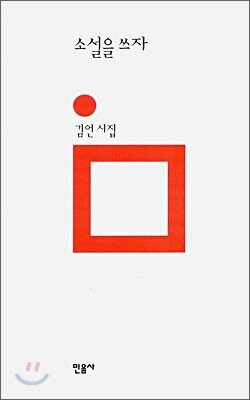Kim Un (born 1973) is a South Korean poet.
Life
Kim was born in Busan. He studied industrial engineering and Korean literature at Pusan National University and earned his Ph.D in creative writing from Myongji University. Kim made his debut as a poet in 1998, with the publication of six poems including "Haebaragi" (해바라기 The Sunflower) in the journal Poetry and Thought. He has published seven collections of poetry, including Sumswineun mudeom (숨쉬는 무덤 Breathing Tomb), Geoin (거인 Giant), Soseoreul sseuja (소설을 쓰자 Let’s Write a Novel), Neoui aldagado moreul maeum (너의 알다가도 모를 마음 Your Heart that I Don't Understand), and Baekjiege (백지에게 To a Blank Sheet), as well as essays and poetic theory. Kim has received the Bongsaeng Literary Award, the Midang Literary Award, and the Park In-Hwan Literary Award.
Writing
Kim Un's poetry features the extreme exploration of language, making his poetic journey symbolized as a giant radically questioning the form of poetry. In his experiments, poetry has become the arrangement of words that wait for a certain happening, or incidental encountering. In a sense, the poet strives to weave the most secret relations with the world as well as the readers, rather than denying the communication.
Regarding his works, Sin Hyeong-cheol, the critic, has said "reading more than three of these poems a day will possibly result in the overheating and explosion of the reader's brain." And yet these poems "should be read." Far from being merely abstruse, they are creative poems that make possible the imagination of "other poems." In that respect, Kim is a poet who never ceases to explore the world, the nature of existence, and the principles of language. He seeks to say what cannot be said, to communicate with things with which one cannot communicate. He is a poetic fundamentalist who believes that the task of changing the world should begin with the task of changing the language, so much so that his pen name is "Un," meaning "language."
In Kim's poetry, the ultimate question regarding poetry is no different from an extreme exploration of language, which in turn is no different from a fundamental investigation of the domain of poetry. That must be why the poetic fundamentalist released a collection under the title, Soseoreul sseuja. He is not saying that he will actually write a novel, but that he will write a "different kind of poetry." His sixth collection, Neoui aldagado moreul maeum, takes this idea even further, with each poem structured like a short story unto itself. His latest collection, Baekjiege, returns to experimental form bending the confines of language, as well as quiet meditations on the poet's everyday life.
김언(1973~)은 대한민국의 시인이다.
생애
김언은 1973년 부산에서 태어났다. 부산대학교 산업공학과와 국어국문학과를 졸업하고 명지대학교 대학원 문예창작학과에서 박사학위를 취득했다. 김언 시인은 1998년 《시와 사상》에 발표한 〈해바라기〉 외 6개 작품으로 신인상을 받으면서 작품 활동을 시작했다. 이후 시집 《숨 쉬는 무덤》(2003), 《거인》(2005)에 이어 《소설을 쓰자》(2006)를 펴냈다. 2006년 시집 《소설을 쓰자》로 제9회 미당문학상을 수상하며 그만의 고유한 시세계를 구축해나가고 있다. 추계예술대학 문예창작과 교수로 일하고 있다.
작품 세계
김언은 언어를 통해 근원을 모색하고 세계를 전복하고 현실의 밖으로 나가려는 시도를 한다. 시인은 모순과 공포, 고통과 슬픔으로 뒤틀린 현실의 삶을 언어의 힘으로 포착하고 현실 너머를 모색하는 등 시인만의 세계를 구축해가고 있다.
《거인》(2005)은 삶과 현실을 환상을 통해 사유하고 이를 시로 형상화했다. 일상에 대한 성찰을 바탕으로 현실 너머를 예감하는 시인은 절망보다는 나은 세상에 대한 기대와 의지를 시집에 담아내었다.
《한 문장》(2018)에서 시인은 현실의 밖을 봐야 한다고 강조하며, 실패해도 계속해서 싸울 것을 말하고 있다. 특히 현실의 의미 체계를 뛰어넘으려는 시도와 기존의 의미 체계를 무화시키려는 노력을 반복하고 있는데, 이를 통해 시인은 관습적이며 제한된 언어, 답습되는 말의 세계에서 벗어나 언어의 새로운 가능성을 찾고 있다.
《너의 알다가도 모를 마음》(2018)에는 모두 49편의 시가 수록되어 있다. 이 시집에 수록된 작품들은 이전에 시인이 시를 썼던 방법, 즉, 언어를 통해 의미를 전복하고 현실의 경계를 넓히는 방향으로 작업을 했다면, 이 시집에서는 한 편 한 편이 단편소설처럼 서사를 지니고 있어 형식과 내용의 측면에서 다른 경향을 보여주고 있다.
《백지에게》(2021)는 김언 시인의 일곱 번째 시집이다. 이 시집에는 시인이 오랫동안 골몰해 온 경계 밖을 향한 사유와 실험적인 언어가 여전히 시적인 긴장을 형성하고 있으며, 동시에 시인의 일상과 담담한 고백도 한 목소리를 차지하고 있다.
주요 작품
1) 시집
《숨 쉬는 무덤》, 천년의시작, 2003(재개정판, 아침달, 2018)
《거인》, 랜덤하우스중앙, 2005(재개정판, 문학과지성사, 2021)
《소설을 쓰자》, 민음사, 2009.
《모두가 움직인다》, 문학과지성사, 2013.
《한 문장》, 문학과지성사, 2018.
《너의 알다가도 모를 마음》, 문학동네, 2018.
《백지에게》, 민음사, 2021.
2) 산문집
《누구나 가슴에 문장이 있다》(서랍의날씨, 2017)
3) 시론집
《시는 이별에 대해서 말하지 않는다》(난다, 2019)
수상 내역
2009년 제9회 미당문학상
2009년 동료들이 뽑은 올해의 젊은 시인상
2012년 제13회 박인환문학상
2021년 제29회 대산문학상



